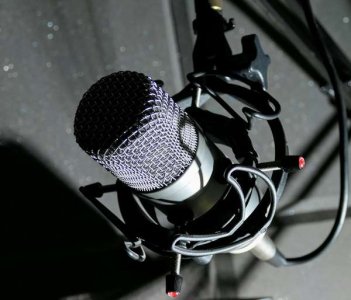Step back in time: Can you pass this 1920s word challenge?
- Replies 1
If you’ve ever found yourself second-guessing how to pronounce “colonel,” or wondered why “bough,” “cough,” and “through” all sound so different, you’re not alone.
English is a beautiful, sprawling language—but it’s also a notorious minefield of odd spellings, silent letters, and words that seem to break their own rules.
For those who grew up diagramming sentences and memorizing spelling lists, it’s both a source of pride and, sometimes, a bit of frustration. Which side are you on?
But did you know that, back in the early days of radio, mastering these quirks wasn’t just a matter of pride—it was a job requirement?
In the 1920s, aspiring radio announcers faced a pronunciation test so tricky, it could trip up even the most seasoned wordsmiths.
Today, we’re taking a trip down memory lane to see if you could have passed this classic test—and what it reveals about the ever-evolving English language.
The 1920s Announcer’s Test: A Real Tongue-Twister
Imagine you’re in a bustling New York radio studio, the air thick with anticipation. You’re handed a slip of paper—no time to prepare, no chance to practice. Here’s what you’re asked to read aloud.

“Penelope Cholmondely raised her azure eyes from the crabbed scenario. She meandered among the congeries of her memoirs. There was the Kinetic Algernon, a choleric artificer of icons and triptychs, who wanted to write a trilogy. For years she had stifled her risibilities with dour moods. His asthma caused him to sough like the zephyrs among the tamarack.”
How did you do? Did your tongue tangle, or did you breeze through?
This passage, shared by legendary radio columnist Ben Gross in his 1954 memoir, was reportedly used in the 1920s to audition would-be radio announcers.
The goal? To weed out those who couldn’t handle the trickiest pronunciations English had to offer.
Also read: The math problem for kids that’s baffling grown-ups—Can you crack the code?
Let’s break down some of the words that have stumped generations—and see how you measure up.
The Trickiest Words, Decoded
Here’s how major dictionaries explain some of the more puzzling pronunciations from the passage:
Source: BrainStuff - HowStuffWorks / Youtube.
Why Pronunciation Mattered—And Still Does
In the golden age of radio, clear and “correct” pronunciation was a must. Announcers were the voices of authority, and their job was to be understood by everyone, everywhere.
That meant mastering not just the basics, but the oddballs, the imports, and the tongue-twisters.
Today, we’re a little more relaxed about pronunciation. Regional accents are celebrated, and “correctness” is often a matter of context.
But the legacy of those early announcers lives on—in our love of language, our curiosity about words, and our willingness to laugh at ourselves when we get it wrong.
Source: CaptainOT / Youtube.
Think the 1920s test was tough? Later announcers faced even more daunting challenges.
In the 1930s, NBC hopefuls had to tackle lists of foreign names, place names, and tongue-twisters like “the seething sea ceased to see, then thus sufficeth thus.” By the 1940s, some tests required reciting ever-longer, ever-more-complicated sentences from memory, all in a single breath:
“One hen
Two ducks
Three squawking geese
Four limerick oysters
Five corpulent porpoises
Six pair of Don Alverzo’s tweezers
Seven thousand Macedonians, in full battle array
Eight brass monkeys from the ancient, sacred, crypts of Egypt
Nine apathetic, sympathetic, diabetic, old men on roller skates, with a marked propensity towards procrastination and sloth
Ten lyrical, spherical, diabolical denizens of the deep who all stall around the corner on the quo of the quay of the quivvey, all at the same time.”
Suddenly, Penelope Cholmondely doesn’t seem so intimidating, does she?
Read next: Are you smarter than the internet? Try solving this math puzzle that's baffling everyone online!

Now it’s your turn! Try reading the announcer’s test passage aloud. Did any words trip you up? Do you have a favorite “impossible” English word or a family story about a pronunciation mishap? Share your experiences in the comments below!
English is a beautiful, sprawling language—but it’s also a notorious minefield of odd spellings, silent letters, and words that seem to break their own rules.
For those who grew up diagramming sentences and memorizing spelling lists, it’s both a source of pride and, sometimes, a bit of frustration. Which side are you on?
But did you know that, back in the early days of radio, mastering these quirks wasn’t just a matter of pride—it was a job requirement?
In the 1920s, aspiring radio announcers faced a pronunciation test so tricky, it could trip up even the most seasoned wordsmiths.
Today, we’re taking a trip down memory lane to see if you could have passed this classic test—and what it reveals about the ever-evolving English language.
The 1920s Announcer’s Test: A Real Tongue-Twister
Imagine you’re in a bustling New York radio studio, the air thick with anticipation. You’re handed a slip of paper—no time to prepare, no chance to practice. Here’s what you’re asked to read aloud.

The English language is notoriously tricky, with inconsistent spelling and pronunciation, requiring announcers in the 1920s to pass special pronunciation tests using complex passages. Image source: Ken Barton / Unsplash.
“Penelope Cholmondely raised her azure eyes from the crabbed scenario. She meandered among the congeries of her memoirs. There was the Kinetic Algernon, a choleric artificer of icons and triptychs, who wanted to write a trilogy. For years she had stifled her risibilities with dour moods. His asthma caused him to sough like the zephyrs among the tamarack.”
How did you do? Did your tongue tangle, or did you breeze through?
This passage, shared by legendary radio columnist Ben Gross in his 1954 memoir, was reportedly used in the 1920s to audition would-be radio announcers.
The goal? To weed out those who couldn’t handle the trickiest pronunciations English had to offer.
Also read: The math problem for kids that’s baffling grown-ups—Can you crack the code?
Let’s break down some of the words that have stumped generations—and see how you measure up.
The Trickiest Words, Decoded
Here’s how major dictionaries explain some of the more puzzling pronunciations from the passage:
- Cholmondely (n.): Although it looks complex, the surname Cholmondely (or Cholmondeley) is actually pronounced “Chumley,” as stated in the Cambridge English Pronouncing Dictionary.
- Azure (n., adj.): According to Cambridge, there are eight possible ways to say azure, depending on syllable stress, the sound of the “a” (like in bay or bat), and whether the “z” is a zoo or “zh” sound (as in leisure or treasure). But for a 1950s NBC job, they expected “AZH er.”
- Crabbed (adj.): When used to describe something as “difficult” or “bad-tempered,” crabbed should rhyme with rabid, not jabbed.
- Congeries (n.): In the U.S., this noun meaning “a disorderly collection” is pronounced “CON-juh-reez.” In contrast, British usage—and NBC's—prefer “con-JEER-eez.” Either way, it’s singular and often unexpected.
- Algernon (n.): The first syllable gets the stress in Algernon, but opinions differ on the rest. Both “AL-jer-nun” and “AL-jer-non” are considered correct by most dictionaries.
- Choleric (adj.): Used to describe someone who angers easily, choleric is typically said “COL-uh-rick.”
- Artificer (n.): This word for a skilled craftsperson is derived from artifice, but the stress usually shifts to the second syllable: “ar-TI-fi-ser.”
- Triptychs (pl. n.): The final “h” in triptych is silent. The word, referring to a three-panel artwork, rhymes with cryptic.
- Risibilities (pl. n.): While risibility means “laughableness,” the plural form is often used to describe “a tendency to laugh.” It rhymes with visibilities.
- Dour (adj.): NBC favored the Scottish pronunciation of dour with a long “oo” sound, as in wooer or bluer, though most dictionaries say it should rhyme with power or sour.
- Sough (v.): This verb—meaning “to moan or whistle like wind”—has no universally accepted pronunciation. NBC went with “suff,” while others say “sow” (rhyming with cow).
- Tamarack (n.): A term for the eastern larch tree, tamarack is pronounced “TAM-uh-rack,” rhyming with anorak.
Source: BrainStuff - HowStuffWorks / Youtube.
Why Pronunciation Mattered—And Still Does
In the golden age of radio, clear and “correct” pronunciation was a must. Announcers were the voices of authority, and their job was to be understood by everyone, everywhere.
That meant mastering not just the basics, but the oddballs, the imports, and the tongue-twisters.
Today, we’re a little more relaxed about pronunciation. Regional accents are celebrated, and “correctness” is often a matter of context.
But the legacy of those early announcers lives on—in our love of language, our curiosity about words, and our willingness to laugh at ourselves when we get it wrong.
Source: CaptainOT / Youtube.
Think the 1920s test was tough? Later announcers faced even more daunting challenges.
In the 1930s, NBC hopefuls had to tackle lists of foreign names, place names, and tongue-twisters like “the seething sea ceased to see, then thus sufficeth thus.” By the 1940s, some tests required reciting ever-longer, ever-more-complicated sentences from memory, all in a single breath:
“One hen
Two ducks
Three squawking geese
Four limerick oysters
Five corpulent porpoises
Six pair of Don Alverzo’s tweezers
Seven thousand Macedonians, in full battle array
Eight brass monkeys from the ancient, sacred, crypts of Egypt
Nine apathetic, sympathetic, diabetic, old men on roller skates, with a marked propensity towards procrastination and sloth
Ten lyrical, spherical, diabolical denizens of the deep who all stall around the corner on the quo of the quay of the quivvey, all at the same time.”
Suddenly, Penelope Cholmondely doesn’t seem so intimidating, does she?
Read next: Are you smarter than the internet? Try solving this math puzzle that's baffling everyone online!
Key Takeaways
- The English language is notoriously tricky, with inconsistent spelling and pronunciation, requiring announcers in the 1920s to pass special pronunciation tests using complex passages.
- The classic announcer’s test included words and names with surprising or non-intuitive pronunciations, such as “Cholmondely” (said “Chumley”) and “azure” (with various accepted pronunciations).
- Many words in the test can have more than one “correct” pronunciation depending on the dictionary or dialect, and strict pronunciation standards have relaxed since the 1920s.
- Later announcers’ tests became even tougher, including difficult list recitations, tongue-twisters, and foreign names, challenging not only pronunciation but also memory and breath control.
Now it’s your turn! Try reading the announcer’s test passage aloud. Did any words trip you up? Do you have a favorite “impossible” English word or a family story about a pronunciation mishap? Share your experiences in the comments below!






